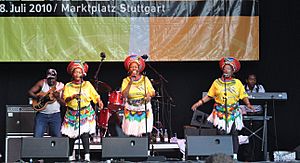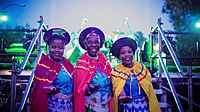Mahotella Queens facts for kids
Quick facts for kids
Mahotella Queens
|
|
|---|---|

Mahotella Queens, 2010
Left to right: Nobesuthu Mbadu, Hilda Tloubatla, Mildred Mangxola |
|
| Background information | |
| Origin | Johannesburg, South Africa |
| Genres | Mbaqanga, mgqashiyo |
| Years active | 1964–present |
| Labels | Gallo, AS Entertainment |
| Members |
|
The Mahotella Queens is a famous South African all-female music group. They started in 1964 thanks to music producer Rupert Bopape. The group is known for their special singing style, their guitar-based mbaqanga music, and their energetic dancing on stage.
Rupert Bopape was a talent scout and producer for Mavuthela Music Company. This company was part of Gallo Africa and focused on music by Black artists. Bopape created the Mahotella Queens to be the main girl group for his company.
The group often sang with a male singer named Simon 'Mahlathini' Nkabinde. He was known for his deep voice. Together, they had many hit songs in the 1960s. The Queens during this time usually included Hilda Tloubatla, Juliet Mazamisa, Ethel Mngomezulu, Nobesuthu Mbadu, and Mildred Mangxola.
The Queens and Mahlathini were supported by Mavuthela's house band, the Makgona Tsohle Band. This band included Marks Mankwane on lead guitar and West Nkosi on alto saxophone.
In 1972, the Mahotella Queens' original members left because of disagreements over money with Bopape. Mahlathini also left for a similar reason. However, the Queens continued with new members and remained popular through the 1970s and 1980s.
In 1987, South African music became very popular worldwide. Three of the original singers – Hilda Tloubatla, Nobesuthu Mbadu, and Mildred Mangxola – returned to the group. With Mahlathini, the group became very successful touring internationally. They still perform today.
Even after Mahlathini, Marks Mankwane, and West Nkosi passed away in the late 1990s, the Mahotella Queens kept performing and recording. In 2013, Mildred Mangxola retired. Amanda Nkosi joined the group to replace her.
Contents
The Group's Journey
Early Years: 1964-1972
Rupert Bopape first put together a team of female singers. They would record songs using different group names. But the name Mahotella Queens became the most famous. The group usually had five singers chosen from a larger group of talented vocalists. These included Hilda Tloubatla, Juliet Mazamisa, Ethel and Francisca Mngomezulu, Mildred Mangxola, Nobesuthu Mbadu, Windy Sibeko, Mary Rabotapi, and Nunu Maseko.
The music made by Mahlathini, the Mahotella Queens, and the Makgona Tsohle Band was a type of mbaqanga music. Mbaqanga is a lively dance music that mixes traditional African sounds with modern elements. It uses electric instruments. Their unique style was called "mgqashiyo." It featured fast female harmonies combined with Mahlathini's powerful, deep male voice. Mahlathini became famous for his "groaning" vocals.
The group had many hit songs in the 1960s. These included "Thoko," "Sithunyiwe," "Pitsa Tse Kgolo," "Ngikhala Ngiyabaleka," and "Izulu Liyaduduma." Their successful songs were put together on albums like Meet the Mahotella Queens (their first album), Indoda Mahlathini, Marena, Marks Umthakathi, and Umculo Kawupheli.
Changes and Challenges: 1972-1987
In 1972, Mahlathini and some of the Queens left the group. This happened because of disagreements over how much money they earned. Many members joined other groups like Izintombi Zesi Manje Manje. Mahlathini also moved to another record company. There, he recorded with a new group of singers called The Queens.
Bopape worked with the Makgona Tsohle Band to find new members for the Mahotella Queens. The new lineup included Emily Zwane, Beatrice Ngcobo, Thandi Radebe, Thandi Nkosi, and Caroline Kapentar. In 1972, West Nkosi became a producer. One of his first projects was with a choir that later became famous, Ladysmith Black Mambazo.
The Mahotella Queens continued to record and perform well in the 1970s. They often sang with another deep-voiced singer named Robert 'Mbazo' Mkhize. He was also the lead singer of a popular male group called Abafana Baseqhudeni. Guitarist Marks Mankwane became the Queens' producer after Rupert Bopape retired in the late 1970s.
The group released albums like Izibani Zomgqashiyo, Tsamaya Moratuoa, Thatha Izimpahla Zakho, Ezesimanje, and Tsa Lebowa. In the 1980s, the Queens' popularity went down. This was because musical tastes changed. Mbaqanga music was replaced by styles like soul and disco in the townships.
International Success: 1987-1999
In 1983, Marks Mankwane brought Mahlathini back together with five of the original Mahotella Queens. They formed a group called Mahlathini Nezintombi Zomgqashiyo. However, mbaqanga music was not as popular then, so the project only lasted a year.
In the mid-1980s, some international music projects helped bring the original Mahotella Queens and Mahlathini back into the spotlight. These included the important album The Indestructible Beat of Soweto and Paul Simon's Graceland album.
In 1987, West Nkosi convinced Mankwane to have the Queens work under his production. The group's lineup changed completely. The current members were replaced by three singers from the original 1960s group: Hilda Tloubatla, Nobesuthu Mbadu, and Mildred Mangxola.
Together with Mahlathini and most of the original Makgona Tsohle Band, the Queens recorded their first album for an international audience, Thokozile. This album was very successful. It led to overseas promoters wanting them to perform. The group, now known as Mahlathini and the Mahotella Queens, began a long international touring career. They had a successful first show in France at the Angouleme Festival.
In 1988, the group performed at a special concert for Nelson Mandela's 70th birthday. This concert was held at London's Wembley Stadium. Mahlathini and the Mahotella Queens continued to record successful albums. These included Paris - Soweto, Mbaqanga, Rhythm and Art, Stoki Stoki, and Umuntu.
In 1991, producer West Nkosi left the group. Marks Mankwane returned to producing Mahlathini and the Mahotella Queens. He also continued to play lead guitar for the group.
Continuing Legacy: 1999-Present
Mahlathini had health problems due to diabetes. He gave his last performance with the Mahotella Queens in 1997. The next year, former producer West Nkosi died in a car crash. On the day of his funeral, guitarist and producer Marks Mankwane also passed away due to complications from diabetes.
Mahlathini and the Mahotella Queens decided to continue to honor their band members who had passed away. They recorded the album Umuntu in early 1999. During the making of the album, Mahlathini's health got worse. He died in July 1999 after several months of illness.
After a time of sadness, the Mahotella Queens decided to return to music. In 2000, they recorded a new album called Sebai Bai. This album was very successful and praised by international audiences. It was dedicated to Mahlathini, Mankwane, and Nkosi. Some musicians who joined the Queens on this album included Victor Mkhize on lead guitar, Madoda Ntshingila on bass, and Regis Gizavo on accordion. The Queens also continued to tour, performing in the United States in 2002 and 2003.
In 2004, the group released an experimental album for a younger audience, Bazobuya. It mixed their familiar mgqashiyo sound with modern beats. In 2005, the Queens released Reign & Shine. This album was different from their usual sound. It featured a cappella (singing without instruments) performances. They were backed by traditional percussionist Veli Shabangu and occasional guitar from their band.
With Shabangu, the group toured the United Kingdom in May and June 2006. They were the opening act for Ladysmith Black Mambazo. The Queens also headlined the WOMAD festival in July 2006 with their full backing band.
In 2007, the Mahotella Queens released a gospel album called Siyadumisa. This recording featured modern versions of traditional Zulu hymns. The group completed a tour of Europe on August 25, 2007. They performed their new songs at various WOMAD festivals. The Queens also performed in South Africa in late 2007 and 2008.
The Queens were part of Pee Wee Ellis's show Still Black, Still Proud: An African Tribute to James Brown in 2010. South African jazz artist Hugh Masekela joined the Mahotella Queens for a special UK tour in November 2010. Their show at London's Southbank Centre was completely sold out.
In 2013, the Mahotella Queens took part in a competition. They wanted to find the theme song for the MTN 8 football tournament. They recorded a modern version of one of their well-known hits, "Gazette/Kazet." They were joined by male singer Zamo and Kwaito star Brickz.
In 2016, the group became popular again. They were featured on rapper Cassper Nyovest's hit song "Malome."
Discography
The Mahotella Queens have recorded many songs throughout their career. They made hundreds of recordings at Gallo-Mavuthela in the 1960s and 1970s. The Queens stayed with Gallo until 2005. Then, they joined an independent company led by former Gallo director Antos Stella.
Even though the Queens recorded a lot, only some of their older music is available to buy. Most of the music you can find today was recorded after the late 1980s for international audiences.
 | Ernest Everett Just |
 | Mary Jackson |
 | Emmett Chappelle |
 | Marie Maynard Daly |


